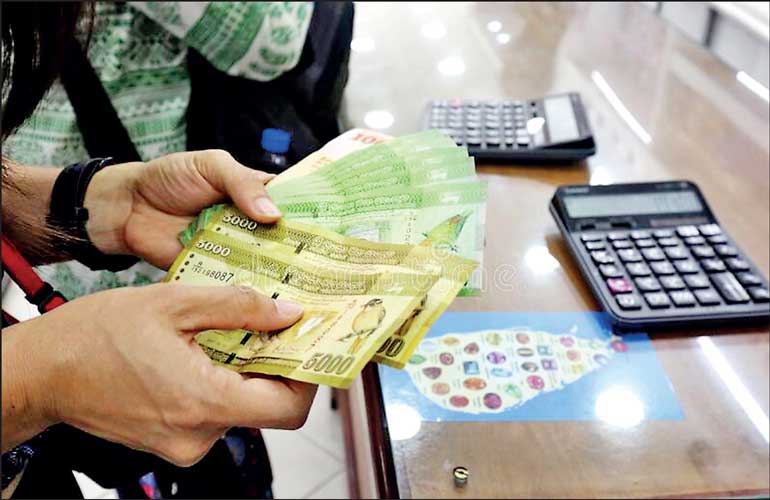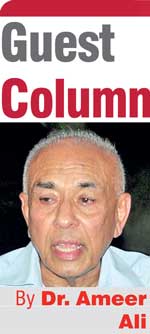Thursday Feb 12, 2026
Thursday Feb 12, 2026
Friday, 31 March 2023 00:15 - - {{hitsCtrl.values.hits}}

It is the stability and protection of Sri Lanka’s financial sector that is the prime concern of IMF, and all its recommendations and conditionalities revolve round that chief objective
 Two Mission Chiefs of IMF, Peter Breuer and Masahiro Nozaki, in their opening remarks to a press briefing of the Executive Board Approval of EFF for Sri Lanka, emphasised the importance of anti-corruption and governance reforms as a central pillar of the EFF-supported program and added that for the first time in Asia IMF is said to conduct in this country an in-depth governance diagnostic exercise. This should be music to the ears of all progressive minded observers and critics of Sri Lankan governance that has magnanimously tolerated this evil to grow and prosper over decades.
Two Mission Chiefs of IMF, Peter Breuer and Masahiro Nozaki, in their opening remarks to a press briefing of the Executive Board Approval of EFF for Sri Lanka, emphasised the importance of anti-corruption and governance reforms as a central pillar of the EFF-supported program and added that for the first time in Asia IMF is said to conduct in this country an in-depth governance diagnostic exercise. This should be music to the ears of all progressive minded observers and critics of Sri Lankan governance that has magnanimously tolerated this evil to grow and prosper over decades.
In fact, social licensing of corruption is a price the architects and guardians of the system were prepared to pay to maintain the Sinhala Buddhist majoritarian superstructure, as discussed in one of my previous contributions to this journal (CT).
However, one would like to test the seriousness and sincerity of IMF’s resolve to end corruption by recalling a piece of information highlighted by Minister of Justice Wijeyadasa Rajapakshe in 2022. According to him, around $ 53 billion was said to have been stacked away abroad by Sri Lankans despite several concessions and benefits granted by governments to bring that money back. Wasn’t this an act of corruption? Perhaps it was that unpatriotic hoarding by the wealthy and influential which prompted a former Governor of CBSL, Professor Lakshman, to invite all Sri Lankans with dollars kept abroad to bring that money back without any question being asked. Given the desperate situation at that time he was even prepared to give license to money laundering.
To the current CBSL Chief Dr. Nandalal Weerasinghe, “illicit financial inflows through mis-invoicing” seems to be a trivial issue, and in his briefing to the Parliamentary Committee on Public Finance (COPF) he callously dismissed that accusation and said that “they (exporters) probably keep it out or bring it here – that’s their business.” How does one judge this attitude coming from the head of the supreme monetary institution? In the meantime, President cum Finance Minister RW is preparing to introduce an anti-corruption legislation in the parliament, to abide by IMF’s instruction.
IMF’s $ 2.9 billion and an expected $ 5-7 billion from other sources is pittance in comparison to that $ 53 billion stacked away. Shouldn’t the IMF Board raise this specific issue with the Government if it is serious about ending corruption in Sri Lanka? The problem with financial administration and with all administration in this country is its class bias mixed with an ethnonational bias. This is why tax collection is so inefficient and tax revenue is so poor in this country and raising the rates alone is no solution to this systemic crisis.
The class bias is in fact a common factor between Sri Lankan governance and operations of IMF. Accordingly, it is the stability and protection of Sri Lanka’s financial sector that is the prime concern of IMF, and all its recommendations and conditionalities revolve round that chief objective. If that objective could bring some positive benefits to the real economy that would be a bonus and side effect of financial restoration. It is worth digressing on this point a little further to understand how real economies all over the world had fallen victims to financial turbulence and to the whims and fancies of financial manipulators. In that context, the impact on real economies of the collapse of Silicon Valley Bank, Credit Suisse and lately the turbulence in Deutsche Bank shares are yet to be assessed. Given the high probability of a global economic downturn in 2023, that impact could only worsen the situation.
Economics teaches students that the primary role of a financial sector is to facilitate activities in the real economy, which produces, consumes and exchange goods and services needed by humanity. Today, the financial sector has grown to such a megalith level that it has no correlation with the quantum of activities in the real economy. In fact, money itself has lost any meaningful definition and it is so slippery to escape the regulations and control of every monetary institution created for that task. Central Banks have virtually become an anachronism in a world of Bitcoins and cryptocurrencies and nonbank financial intermediaries. According to one conservative estimate, the total amount of money needed to exchange all the goods and services produced and stored in the real economy is not more than one quarter of the money that had been created and stored. If so, what is the role of the other three-quarters?
There is also another puzzle related to this pandemonium. Sometime back, an exercise was carried out by researchers in international trade and payments to test the hypothesis that in a world economy operating completely on principles of free trade and free flow of resources the difference between the total Balance of Payment (BOP) surpluses and deficits in the global economy should be zero. To the researchers surprise they found that that whole world was experiencing a BOP deficit. Against which country or entity? It would be a mind-boggling exercise to answer these questions. But one fact is undisputable. The finance sector has grown so detached from the real sector, that the former’s fragility and volatility are holding the real economy to ransom. IMF is a biased referee watching this anomalous system.
In that sense, IMF too has moved away from its original task of providing support to rectify chronic BOP deficits experienced by a country, and it is more interested in protecting the neoliberal financial architecture. The nature and extent of BOP imbalances in countries like Sri Lanka are therefore not simply a reflection of the state of play in the country’s legitimate or licit transactions with its trading partners, although in accounting terms it may appear so, but more importantly they are impacted by the volume and value of unrecorded and illicit transactions across countries. The $ 53 billion mentioned above falls into that illicit category.
If IMF is serious about eradicating corruption, shouldn’t it insist on RW and his Government to investigate this scandalous accumulation and call for measures taken or should be taken to bring that money back into the country? That investigation would open a Pandora Box, which would expose the involvement of corruptors some of whom may be sitting in the current parliament. That IMF did not do so demonstrates the class bias of the referee.
It all boils down to a crisis in the system both at global level as well as local level. In short, the finance sector must be made subservient to the real sector. Sri Lanka cannot do anything to change the global order, but it can do a lot to change the local order.
IMF’s interference and its prescriptions are now fait accompli. Even the NPP that is in alliance with the Aragalaya generation and argues for system change should accept the IMF reality if elected to power. However, there could be reordering of priorities and redirection of IMF’s assistance so that the real economy is assisted directly, so that the revival of that sector helps to stabilise the financial sector. Ultimately, it is by producing and exporting real goods and services that an economy could earn surplus in BOP which would strengthen its currency and enable reducing the debt burden. In that pursuit, eradication of corruption would be among the top priorities for action. Given the geopolitical tension in the Indian Ocean and Sri Lanka’s strategic position IMF’s shareholders would have to agree to such reordering.
(The writer is attached to Murdoch Business School, Murdoch University, Western Australia.)